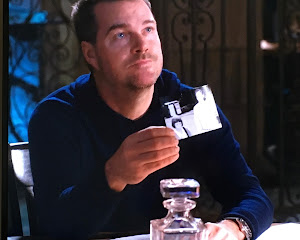Episode 9, Season 12 - "A Fait Accompli"
I'm not writing a review this week because I didn't watch the episode all the way through. In fact, I stopped watching after the first flashback because the character I saw and heard in that flashback was not Callen, and from there I just skipped ahead. Oh, the actor looked like a young Callen and had similar mannerisms, but the character wasn't Callen.
I'm not sure what's going through Gemmill's mind or what the endgame might be, but rewriting a character's background is not a good decision. A character should evolve--and, in some ways, Callen has evolved--just as all the other characters on the show have evolved, but Gemmill and company seem determined to rewrite Callen's personal history, and that is a huge mistake.
The well-adjusted, confident young man in the flashback who delighted his girlfriend by telling her that he engaged in an easy, hour-long conversation with her father was not Callen. Callen--the G. Callen created by Shane Brennan--had a traumatic childhood experience: he witnessed the murder of his mother, arrived in a strange country when he was five, was separated from his sister and put into the foster system where he stayed for 13 years moving between orphanages and foster homes. During these years, he experienced abuse at the hands of adults and kids. He had no mother, no father. He grew up almost entirely on his own. He was wary of people and did not make friends easily. He kept his emotions to himself because as he said in "Skin Deep" when talking with Lance, another former foster child, "Only this time you don't let anyone in because it's too risky." The Callen who spoke to Lance, who watched his foster dad beat a foster brother to death, who spent three weeks in juvie, who punched a hole in the wall of the shelter bathroom, who understood Flynn and let him disappear, who comforted Nadir was not the Callen we saw in this flashback. The young Callen in this flashback grew up in a family with at least one loving parent, wasn't bullied or beaten, and never suffered significant trauma in his childhood.
It's also a huge problem when writers ignore important, defining incidents in a character's background. What they're doing with Callen would be like suddenly deciding Deeks didn't shoot his dad or Kensi didn't have a fiance before working at OSP. In the final flashback, Callen decides to forgo a "normal" life and go with Hetty because he believes he'll never know who his father is--not his father and mother, just his father--if he doesn't. Two problems: first, Callen never had the chance to have a "normal" life--none of Hetty's "children" did (a guy who can fit his belongings in a knapsack and sleeps on a bedroll is not the "corporate" type), and second, why does Callen only mention his father? The fact that Hetty knows who Callen's mother is and what happened to her and doesn't tell him until many years later after he's worked for her for more than four years (in the episode "Deadline"), makes her, in this flashback, to be a cold, heartless, controlling woman. Is that how the writer wanted us to see her relationship with her "son"? If so, he got it right, and it creates an odd juxtaposition to her relationship with the rest of her team whom she obviously cares for deeply. It's also one more failure in a long line of her failures when her "son" needed help. His search for his family is only one element that would lead to a lonely life for Callen. The other, more critical element, is the trauma he experienced early in his life. I don't know the personal experience of either writer, but as someone who's taught foster kids, kids abandoned by their families, and kids abused by their families, this young Callen's behavior was light years distant from that experience, and his relationship with his girlfriend far too "normal.".
Callen was the reason I began watching NCIS: LA, and while I like all the characters, seeing what Gemmill and the writers are doing to this remarkable character makes it difficult for me to enjoy the series as much as I have in previous years. I'll probably still watch it occasionally--it's been part of my life for twelve years and helped me weather some difficult times--but it's not the same. I realize it's "just a show." and that there's so much more going on in the world and my life that's more important, but watching it gave me a sense of enjoyment because it was a little like reading a good book by a favorite author. Now, it's as if the author has suddenly started writing stories in a completely different voice, in a completely different genre, and what I love most about the series is every week disappearing before my eyes.



Comments
Post a Comment